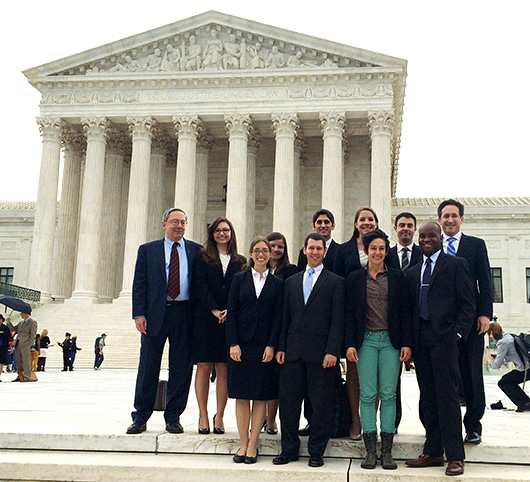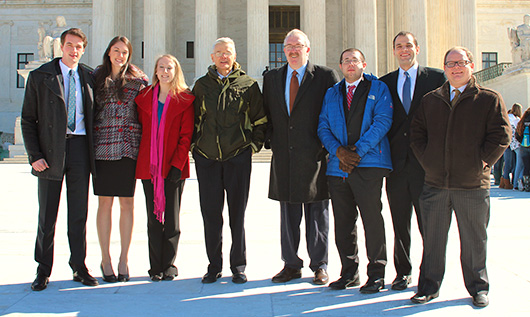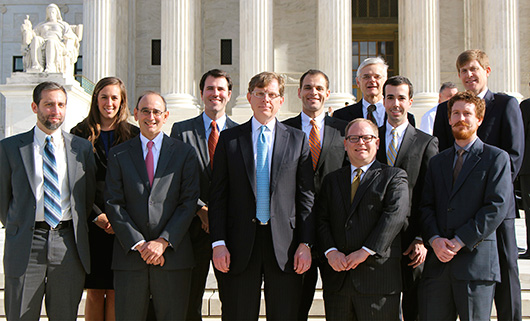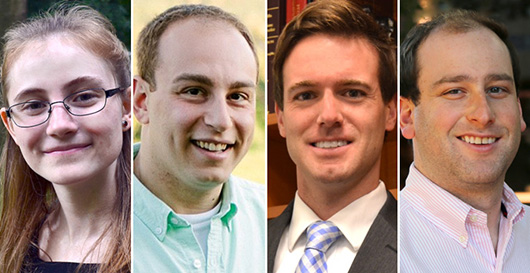UVA Law at the Supreme Court
- Professor Douglas Laycock Wins Religious Liberty Case
- Clinic Gains Unanimous Win With Henderson
- Supreme Court Litigation Clinic Wins Facebook Threat Case
- Four Alumni to Clerk at the Supreme Court

From left, Professor Douglas Laycock at the Supreme Court when he argued Holt v. Hobbs, pictured with Sarah Rafie ’16, Jennifer Carl ’16, Caitlin Shea ’16, Andrew Mandelbaum ’16, Jad Khazem ’16, Katie Barber ’15, Courtney Miller ’16, James Nelson ‘09, Sean Johnson ’16, and Professor Micah Schwartzman ’05.
Professor Douglas Laycock Wins Religious Liberty Case
By Mary Wood
The Supreme Court ruled unanimously in January that an Arkansas inmate could wear a beard according to his religious beliefs, in a case argued by Professor Douglas Laycock.
“This is a clear and unanimous statement from the Supreme Court,” Laycock said of the decision. “Prison officials, and courts, must take seriously the obligation to protect the religious practices of prisoners.”
Holt v. Hobbs, which Laycock argued in October, involved an Arkansas correctional facility that refused to let Gregory Holt wear a half-inch beard, though hair longer than a half-inch was allowed, and beards a quarter-inch or shorter were permitted for medical conditions. Holt brought the petition against corrections director Ray Hobbs and related parties under the Religious Land Use and Institutionalized Persons Act.
Holt, aka Abdul Maalik Muhammad, is serving a life sentence for burglary and domestic battery. He said the prison policy infringed upon his ability to practice his Muslim faith.
“This is not just a win for one Muslim prisoner in Arkansas—it is a win for prisoners of all faiths,” Laycock said. More at: www.bit.ly/s15holtruling.

From left, Joel Johnson ’15, Jennifer Maloney ’15, Anna McDanal ’15, Professor Dan Ortiz, clinic instructor David Goldberg, Samuel Strongin ’15, Peter Benson ’15, and Professor Toby Heytens ’00 pause for a photo after the Henderson argument.
Clinic Gains Unanimous Win With Henderson
by Mary Wood
The Supreme Court delivered a unanimous decision on May 18 in favor of a Florida man represented by the Supreme Court Litigation Clinic.
Henderson v. United States involves the “felon-in-possession” statute, which bans felons from possessing firearms. In the case, former U.S. Border Patrol Agent Tony Henderson had provided his 19 guns for safekeeping to the FBI in 2006, during his prosecution for felony drug offenses. After serving six months in prison, he tried to arrange to transfer the guns to someone who would pay him for them.
“The government refused, saying that to do so would somehow attach constructive possession of the guns to our client,” said Professor Daniel Ortiz, director of the clinic.
Henderson v. United States is the twelfth case the clinic has taken to Washington, and the fourth case Ortiz has argued before the Court. The clinic offers students the chance to handle actual cases, from the seeking of Supreme Court review to briefing on the merits.
Ortiz, who argued the case at the Supreme Court on February 24, said he wasn’t surprised at the unanimous decision.
“After the argument, we couldn’t count a single justice who was clearly on the government’s side,” he said. “It’s a wonderfully clear, concise, direct opinion. It repudiates the government’s odd view of what counts as possession pretty clearly—it doesn’t have any difficulties in getting to that point. It’s a great example of Justice [Elena] Kagan’s clear, direct style.”
Ortiz said the Supreme Court’s decision will have a broad impact.
“There are over a million people convicted of felonies in this country every year, and in many cases the value of the firearms can be quite high,” he said.
Find CBS News coverage of the clinic, and more, at: www.bit.ly/s15henderson.

A mix of counsel, professors, and students on the steps of the Supreme Court after arguing the Elonis case in December. From left, Ronald Levine, Julie Wolf ’15, Abraham Rein, Lide Paterno ’15, John Elwood, Peter Benson ’15, Toby Heytens ’00, Dan Ortiz, Nick Reaves ’15, Trevor Lovell ’15, and Mark Stancil ’99.
Supreme Court Litigation Clinic Wins Facebook Threat Case
by Mary Wood
The Supreme Court handed another victory to the Supreme Court Litigation Clinic June 1. In Elonis v. United States, justices sided 7–2 with the clinic’s client, Anthony Elonis, who was appealing his conviction for making threats against his estranged wife and others on Facebook.
Elonis argued his comments, styled as rap lyrics, were made in jest to blow off steam.
Without addressing the First Amendment issue in the case, Chief Justice John Roberts said in the majority opinion it was not enough for prosecutors to show that Elonis’ comments would make a reasonable person feel threatened.
Clinic Director and Professor Daniel Ortiz said the decision throws out Elonis’ conviction, though it doesn’t clear up a murky area of free speech law.
“It’s a very strong win and a clear opinion that leaves to another day a few big questions—if negligence isn’t enough, what’s the correct level of mens rea required and what role the First Amendment might play in the issue—that the lower courts will consider over the next few years,” he said.
The clinic, which has argued 12 cases in Washington since its inception in 2006, offers students the chance to handle actual cases, from the seeking of Supreme Court review to briefing on the merits.
At issue in Elonis was whether the comments constituted a “true threat.” Clinic Instructor John Elwood, a partner at Vinson & Elkins in Washington, D.C., argued on behalf of Elonis and the clinic on December 1.
“This case is particularly relevant in an age when we increasingly communicate electronically with people we have never met in person,” Elwood said. “People who know me well may know when I’m kidding, but people who are just reading something on Twitter or Facebook may not know that this is something that [is meant] facetiously.”
Elonis was 27 when, in the span of a few weeks, his wife of seven years left him and he lost his job.
“He put up some posts on Facebook, although they were typically posted with all sorts of disclaimers all over them—that they were basically written for cathartic purposes and weren’t meant to be taken seriously,” Elwood said.
In his posts, Elonis included links to the Wikipedia “Freedom of speech” page and made references to other First Amendment cases. In the meantime, his wife obtained a “protection from abuse” order against him.
“[Elonis] got an unhappy visit from the FBI and of course he put out a post on that one too. The FBI was not amused, and they charged him with making an interstate threat,” Elwood said.
Elonis was convicted of five of six charges, and served 44 months before his release in February 2014. After his release, he was still subject to supervised release for three years and to traditional obstacles from being labeled a felon.
Genevieve Hoffman ’15, a clinic participant who worked on the case, said she was not surprised by the decision.
“It’s consistent with the Court’s precedents dealing with mens rea standards in federal statutes, which I think definitely worked in our favor,” she said. “It was great to see that our work paid off—many of those precedents that we had researched and discussed showed up in the opinion.”
Lide Paterno ’15 also helped with the case. “I loved working on this case because it brought together so many areas of law I had studied throughout my time at UVA, from the basics of criminal law to more advanced First Amendment and statutory interpretation issues,” Paterno said.

Four graduates will clerk for the Supreme Court in the 2015-16 term, including Galen Bascom '13, Jonathan Urick '13, Ben Tyson '14 and Andrew Kilberg '14.
Four Alumni to Clerk at the Supreme Court
With the news that Andrew Kilberg ’14 will clerk for Justice Anthony Kennedy during the 2015–16 term, the Law School can claim four graduates serving as clerks at the Supreme Court, which ties a school record from the 2009–10 term.
Kilberg joins Ben Tyson ’14, Galen Bascom ’13, and Jonathan Urick ’13, who will clerk for Chief Justice John Roberts and Justices Stephen Breyer and Antonin Scalia, respectively. Virginia is fourth in contributing the most clerks to the U.S. Supreme Court from 2005–14, after Harvard, Stanford, and Yale. (The nine justices hire 36 clerks each year.)




